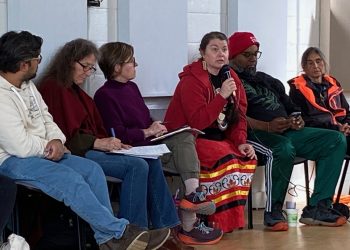More than 100 people attended the annual Gwen Bear Memorial Lecture 2018 held on January 18 at the University of New Brunswick. Albert Marshall delivered a talk titled: “How do we move forward in a co-learning journey?”
The annual lecture honours the memory of Sagatay (Gwen Bear), the first Elder-in-Residence at the Mi’kmaq-Wolastoqey Centre (MWC) at the University of New Brunswick and former president of the NB Native Women’s Council.
Current Elder-in-Residence Imelda Perley gave the opening prayer for the attendees by singing the Wolastoq Honour song, accompanied herself on a drum made by Sagatay herself. Sagatay’s grand-daughter, Aurora, was present and was gifted the drum by Imelda Perley.
In his welcome to the crowd, David Perley, the director of the MWC, reminded the audience that “before UNB was established on this land, [his] ancestors were teaching here” and those teachings have been “passed on from generation to generation.” “Let’s use Wolastoq!” encouraged Perley, instead of St. John River.
From We’kwistoqnik’ (Eskasoni First Nation) in Mi’kma’ki (Nova Scotia), Mi’kmaq Elder Albert Marshall is a survivor of the Shubenacadie Residential School. Elder Marshall and his spouse, Murdena, were recipients of an Honorary Doctorate from Cape Breton University in 2009 for their advocacy work on behalf of the Mi’kmaq people. Marshall is the “designated voice for the Mi’kmaq community on environmental issues.”
Elder Marshall acknowledged Sagatay’s spiritual presence in making him comfortable at UNB even though “most [Indigenous people] from a certain generation don’t have a formal education.” Elder Marshall credits his wife Murdena with helping him develop what “became a mission” in their shared work of advocacy.
According to Elder Marshall, Indigenous people “can no longer live off the land, but neither can anyone else.” He deplores the environmental degradation, “the drastic weather,” and “the challenges the future may bring.” Mother nature is suffering. Elder Marshall’s teaching outline two central concepts that are fundamental to the idea of repairing this relationship.
Etuaptmumk
Etuaptmumk, or “two-eyed seeing,” is central to the Aboriginal way of learning. Elder Marshall is passionate about how to “integrate the two ways of knowledge,” Indigenous and other. Learning institutions are “paramount in preparing [the Mi’kmaq] for the future” but this must be done “without having to compromise who [they] are.” The past “disconnection” from the culture, according to Elder Marshall, had a profound impact. Institutions can help to “validate” young people’s cultural identity and learnings.
Elder Marshall declared: “we’re all here and we’re constantly trying to find a middle ground.” For him, “by sharing our stories, we would be better prepared to meet the challenges, whatever the future might put before us.” Elder Marshall promoted the concept of thorough sharing that only comes from a deep trust between those contributing.
As a relevant example, Elder Marshall commented recent research on “inter-generational trauma.” For him, it is interesting but it demonstrates the need to “reawaken the spirit of the individual.” For Elder Marshall, science has had no way of quantifying the “spiritual” aspect of being human, one of the four central characteristics rounding out the intellectual, physical and cultural aspects of being.
Netukulimk
The other central feature of knowledge for Elder Marshall is Netukulimk. The word contains the Mi’kmaq understanding of sustainability, a holistic idea of preserving and caring for the earth for the next seven generations, or 840 years. From the environment’s perspective, “it’s only the blink of an eye” although it may seem like a long time to humans.
Under Netukulimk, “humans possess responsibilities and other species possess rights”; co-existence, inter-dependence and community spirit are all key to this concept. Netukulimk and Etuaptmumk are thus inherently imbricated.
Elder Marshall accepts that, in the past, most people have been “guilty with [their] silences,” and, as a result “some of those [negative] actions were able to proceed.” These actions led to bad decisions, some of which were subsequently shown not to be sustainable.
Storytelling for Decolonization, Reconciliation and Indigenization
For Elder Marshall, we need to find a way to deepen the meaning of some of these new buzzwords. Elder Marshall is “constantly reflecting” and “unless he is well versed and understands himself, who he is, and what he is doing here” he cannot reflect. As a result, Elder Marshall has found that “the fundamental principal of any relationship is the exchange of stories” and through this we can “draw out the narrative we will need” to reach true reconciliation.
Elder Marshall describes Indigenous experience in the following way: “we have been inside of this wall for so long (…) we’re planning to go over it (…) to seize very opportunity to share stories.” Elder Marshall is certain the wall “will destruct itself” and only then “we will all be living the responsibilities we have all been given” and achieve “balance and harmony with our natural world.”
Elder Marshall is optimistic about the possibilities: “I think, I believe and I hope we will continually build on what we have achieved today.” He told the future teachers in the room that they should consider themselves “knowledge navigators” to “help people come to terms with the knowledge that they have and fine tune it so it can be meaningful.”
Sophie M. Lavoie is an editorial board member of the NB Media Co-op and writes on arts and culture.



![Poster exhibit remembers the two Japanese cities devastated by nuclear weapons [video]](https://nbmediacoop.org/wp-content/uploads/2025/10/image0-3-350x250.jpeg)






